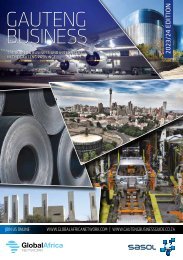South African Business 2019 edition
The 2019 edition of South African Business is the seventh edition of this annual guide to business and investment in South Africa. Regular pages cover all the main economic sectors of the South African economy and give a snapshot of each of the country’s provincial economies. Feature articles on topical issues such as Special Economic Zones and African trade provide unique insights, together with comprehensive overviews of critical economic sectors. Other special features focus on the exciting new possibilities in renewable energy, airports as engines of regional growth and the maritime sector as an entirely new prospect for South African entrepreneurs and businesses. South African Business is complemented by nine regional publications covering the business and investment environment in each of South Africa’s provinces. The e-book editions can be viewed at www.globalafricanetwork.com
The 2019 edition of South African Business is the seventh edition of this annual guide to business and investment in South Africa.
Regular pages cover all the main economic sectors of the South African economy and give a snapshot of each of the country’s provincial economies. Feature articles on topical issues such as Special Economic Zones and African trade provide unique insights, together with comprehensive overviews of critical economic sectors. Other special features focus on the exciting new possibilities in renewable energy, airports as engines of regional growth and the maritime sector as an entirely new prospect for South African entrepreneurs and businesses.
South African Business is complemented by nine regional publications covering the business and investment environment in each of South Africa’s provinces. The e-book editions can be viewed at www.globalafricanetwork.com
You also want an ePaper? Increase the reach of your titles
YUMPU automatically turns print PDFs into web optimized ePapers that Google loves.
OVERVIEW<br />
Automotive<br />
Chinese investors are building at the Coega Industrial Development Zone.<br />
SECTOR INSIGHT<br />
Manufacturers are eyeing the<br />
<strong>African</strong> market for growth.<br />
• Exports have doubled in 10<br />
years.<br />
The automotive sector contributes 33% to manufacturing GDP<br />
and about 6% to overall GDP. It produces approximately 600<br />
000 vehicles per year, supporting 113 000 jobs in three provinces.<br />
Exports have doubled in the 10 years to 2018.<br />
Some of the world’s leading original equipment manufacturers<br />
(OEMs) have recently made large investments in new plant and technology.<br />
According to the National Department of Trade and Industry (dti),<br />
the figure invested since 2009 is approximately R45-billion.<br />
Long-term state support of the industry through the Automotive<br />
Production and Development Programme (APDP) is a major reason for<br />
the continuing health of this vital sector. The industry itself is looking<br />
to Africa for new markets. By increasing total production numbers to<br />
one-million vehicles, the sector will be more viable.<br />
The dti, working together with the NAAMSA, has set targets for 2035<br />
to increase production to 1% of world volumes (1.4-million vehicles), to<br />
increase local content and to double employment and black-owned<br />
businesses in the sector. Automotive and automotive components<br />
make up 30.2% of total manufacturing output and about 7% of the<br />
nation’s Gross Domestic Product (GDP).<br />
Beijing Automotive Industry Group (BAIC) expects to be building<br />
50 000 vehicles per year at its site at Coega Industrial Development<br />
Zone (IDZ) by 2022. BAIC’s investment follows that of another Chinese<br />
firm, First Automotive Works (FAW).<br />
Companies like BAIC may be positioning themselves to push<br />
into Africa, not only for selling vehicles but for automotive parts and<br />
partly-assembled kits. A new pan-<br />
<strong>African</strong> organisation has been<br />
established to promote the auto<br />
industry on the continent, the<br />
<strong>African</strong> Association of Automotive<br />
Manufacturers (AAAM). Most<br />
international brands such as<br />
Volkswagen have given responsibility<br />
for Africa to their <strong>South</strong><br />
<strong>African</strong> offices. VWSA is in a joint<br />
venture in Kenya and is exploring<br />
opportunities in Rwanda.<br />
VWSA is based in the Eastern<br />
Cape where it manufactures<br />
half of the country’s passenger<br />
vehicles and provides 51% of<br />
<strong>South</strong> Africa’s vehicle exports.<br />
The sector accounts for over 40<br />
000 formal sector jobs in the<br />
Eastern Cape.<br />
Volkswagen’s two new types<br />
of Polos started rolling off the<br />
production line in Uitenhage in<br />
2018. Volkswagen’s R6.1-billion<br />
investment will take production<br />
up to full capacity of 160 000<br />
vehicles in <strong>2019</strong>, from 110 000 in<br />
2017. The increase will mean that<br />
a third shift will be introduced.<br />
In addition, VWSA makes<br />
130 000 engines for local demand<br />
and for export. Ford in<br />
Port Elizabeth is the country’s<br />
other engine manufacturer.<br />
SOUTH AFRICAN BUSINESS <strong>2019</strong><br />
118


















